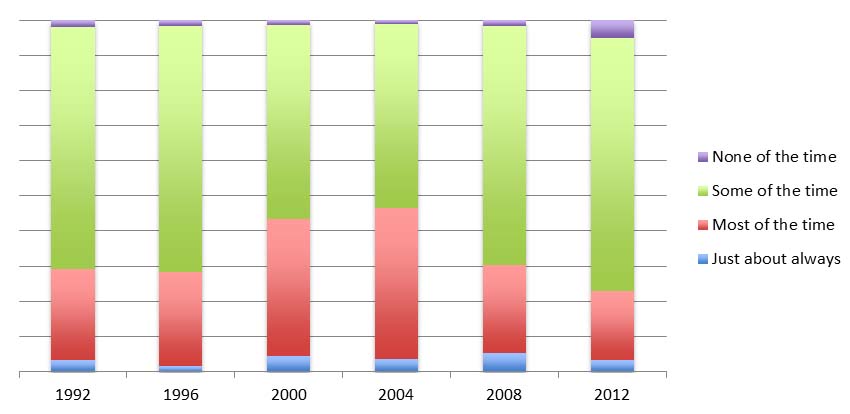Post developed by Katie Brown in coordination with Darrell Donakowski
Yesterday, The Washington Post released an internal report from the National Security Agency (NSA) revealing the agency broke its own privacy rules thousands of times per year since 2008. The source? Edward Snowden, former Central Intelligence Agency (CIA) employee and analyst at NSA contractor Booz Allen. The Post release is the latest chapter in the story of Snowden and government trust.
In June and July of this year, UK’s The Guardian published a series of news articles revealing surveillance by NSA. The US charged Snowden with espionage and revoked his passport. On the lamb, Snowden flew to Hong Kong from Hawai’i. WikiLeaks founder Julian Assange worked to broker asylum for Snowden in Iceland to no avail. Snowden moved onto Russia, residing in the transit zone of Moscow’s Sheremetyevo airport for over a month. On August 1, Russia granted Snowden a one-year asylum. Snowden has an additional 20 applications out for asylum.
Snowden’s asylum prospects complicate US international relations. Obama canceled a summit with Russian Prime Minister Vladimir Putin. Senator Lindsey Graham (R) called for a boycott of the 2014 Olympics in Sochi, Russia, a plan rejected by Speaker of the House John Boehner. On July 2, Bolivian President Evo Morales’ plane was denied entry to several European nations’ airspace and airports amid rumors Snowden was on board, stressing European and US relations with several Latin American countries (Bolivia, Venezuela, and Nicaragua granted Snowden’s request for asylum).
In the wake of the story, questions turned into a debate in the media as to how to understand Snowden. Leaker? Traitor? Punk? The American public appears to see Snowden as a whistleblower. Further, the media linked the immediate fallout – plus the IRS scandal and Benghazi trials – with an 8 point drop in Obama’s approval rating. Hovering around 44%, Gallup shows Obama’s recent ratings below the presidential average of 54%.
But what about trust in the government in particular? The American National Election Studies offers a glimpse of trust in government across time. Asked how much of the time the government does what is right, respondents could choose between three answers: “just about always,” “most of the time,” and “some of the time,” with some respondents volunteering “none of the time.” The graph below displays the spread across time and across answers.
How much of the time do you think you can trust the government in Washington to do what is right?
While this graph does not correspond to the Snowden event, it contextualizes the attributed decrease in trust across time. That is, the decrease in trust attributed to the leak would correspond to a generally decreasing trend.
Last week, Obama announced an overhaul of NSA surveillance. Though Obama refuses to acknowledge Snowden as a catalyst for the changes, Assange claims the move vindicates Snowden. The move suggests a push for transparency and restored trust in the government.




Great Topic